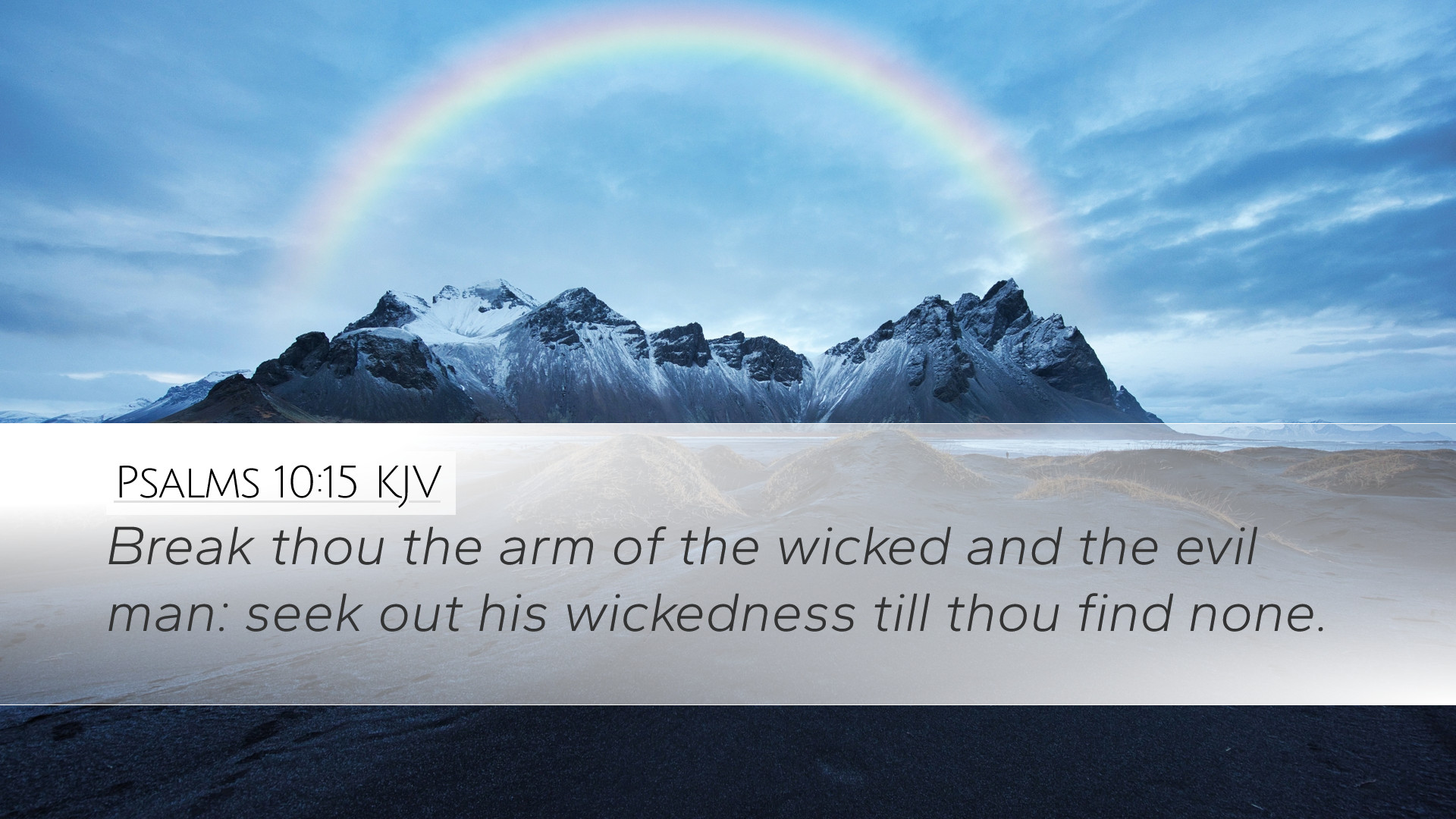Commentary on Psalms 10:15
Psalms 10:15 states, "Break the arm of the wicked and the evil man; seek out his wickedness until you find none." This verse encapsulates a cry for justice from the psalmist, reflecting both a deep lament over the prosperity of the wicked and a plea for divine intervention. The following is an analysis derived from public domain commentaries that aim to illuminate this verse for pastors, students, theologians, and Bible scholars.
Contextual Background
The Psalm is attributed to David and is part of a series of prayers that express profound anguish over the seeming triumph of evil. It serves as both a personal lament and a communal cry for justice. Understanding this context is vital to interpreting the psalm’s plea effectively.
The Cry for Justice
The opening of the psalm represents a poignant struggle, as the psalmist wrestles with the apparent silence of God in times of great injustice. The call to "break the arm of the wicked" symbolizes a desire to render the wicked powerless. The arm, as a metaphor, represents strength and ability, and its breaking signifies the nullification of the wicked’s capacity to oppress.
The Nature of Wickedness
Wickedness is multifaceted. According to Matthew Henry's Commentary, wickedness is characterized by practices that defy the commandments of God and harm others. The psalmist specifically targets the wicked man who embodies arrogance and unrepentant behavior.
Albert Barnes emphasizes that the culmination of wickedness is often seen in acts that not only mar the relationship between God and humanity but also destroy societal structures. This highlights a communal aspect of the cry for help, where the psalmist is not only concerned for personal justice but for the welfare of society at large.
The Divine Response
Psalms 10:15 reflects a deep-seated belief in the justice and oversight of God. Adam Clarke points out that seeking out the wickedness "until you find none" indicates a thorough examination of evil. It suggests a divine inquiry that does not allow for any hidden transgression to go unnoticed.
This brings a sense of urgency to divine justice, indicating that the psalmist believes God is intimately involved in the affairs of man and is capable of executing judgment with precision and fairness.
Theological Implications
This verse sheds light on several key theological themes:
- The Sovereignty of God: The psalmist acknowledges that ultimately, the power to break the arm of the wicked rests with God, affirming His sovereign rule over human affairs.
- The Problem of Evil: The existence of wickedness and suffering prompts profound questions about God's justice, prompting believers to seek a deeper understanding of His plan.
- The Call for Action: This plea serves as an encouragement for believers to actively oppose wickedness in their own lives and communities, aligning with God’s mission for justice.
Practical Application
For pastors and church leaders, this verse serves as a reminder of the prophetic role of the Church in standing against injustice. The communal cries for justice can incarnate in advocacy and action that seeks to uphold righteousness. It mirrors the cry for social justice prevalent in today’s world.
Students and theologians are encouraged to consider the implications of divine justice and the moral obligations that accompany the knowledge of God’s power. This psalm echoes the responsibilities of the faithful to work towards a world where righteousness prevails over wickedness.
Conclusion
The plea in Psalms 10:15 is not merely a request for vengeance, but a heartfelt cry for justice that rings through the ages. It encourages believers to trust in God’s ultimate judgment while calling them to actively participate in the promotion of good. The insights gleaned from the commentaries provide a rich foundation for understanding the depth of this psalm’s complex themes and applications.


